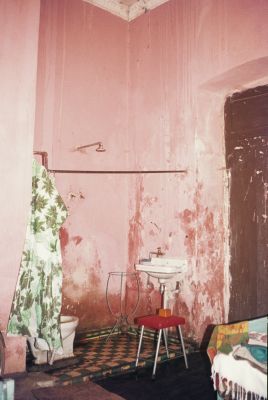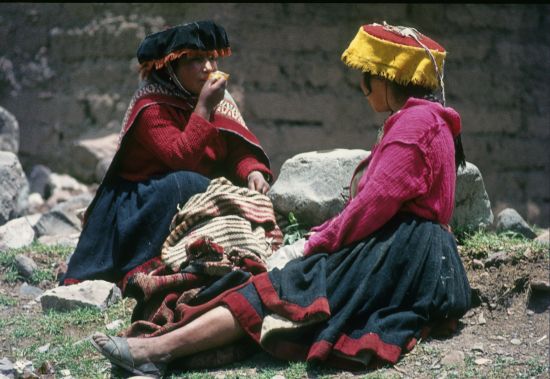| Barelds - Cycling around the world - Cycle stories - Asia, Africa, Europe, America | ||||||||||||||||||||
| home | site map | world | children | recent | cooking | dutch | german | react | ||||||||||||
South-America (3).

Ecuador: a luxurious hotel room, a toilet and shower of your own and bicycle bags on the holes in the floor to keep out the rats.
W
e did not get very far though, within an hour we got stuck because of the rain and so we popped into an open barn near an old hacienda. We had been staring at the grey curtain for a while, when we got company of some gauchos who were apparently at work here. They saw our wet belongings and began to light a fire, soon we were sitting together around it, warming our hands and a pot with mate circulated. Greenish leaves, on which every time boiling water was poured, we sucked in turns the infusion with a silver straw with an egg-like bulge at the bottom. I hung our wet laundry on the cattle gate to dry and began darning our socks. Hours elapsed, the rain was still pouring down and dusk was falling.They showed us a closed shed, cleared it and lit a fire. With running eyes from the smoke we cooked our meal and rolled out the sleeping bags. The next morning: grey again; only in the afternoon the weather cleared. The roads, muddy of course, so we would never get to the next place with the leftover of our food supply, so back to the border. The bank, now open, did not exchange. "Just go to Brazil", they told us. So we crossed the bridge again, the customs officer found this normal and we entered the bank. "No", we heard,"we do not exchange". It was all very incomprehensible. Back to Uruguay. What now? In our hotel they referred us to a money changer in Brazil, we had to cross the bridge again, and there we exchanged dollars for cruzeiros, back to the hotel again and now we got Uruguay's pesos for it. Hey, hey now we could buy some food. What now ? Nothing in the shops in Uruguay? "Tjam , escasa" - scarce - they said, "Go to Brazil", once again across the bridge, to buy loaf and flour.
Southern Brazil had become quite rural, but here we stepped 50 years back. People in clay huts, gauchos in wide ponchos proud on horse back, herds of cows in the infinite grassland and even the children went to school on horses. The traffic consisted of T-Fords only which, with a speed of 40 km/hour (25 miles/hour), thundered past us.
Cruelly the pastoral was disturbed. In Treinta-y-Tres we asked the way to the postoffice, when all of a sudden a man held his ID card in front of us.
"Secret police, come with us" At the police station we had to unload our bicycles and bring all our luggage inside.

Peru: The Indians in the Andes very often had a specific costume of their own.
"Interrogations" was written over the room which was crowded with grim looking men.
"Passports" one of them ordered. We opened our clothes to get to the money belt. "No," they warded off "that is not necessary," thinking that we were going to undress ourselves for a body search. Looking into the passports the whole lot breathed again, in the end we were not guerrillas but normal tourists. We could pick up the luggage which was already searched by others, and we were led out kindly.
Going out of the city we cycled past a check point. Behind plastic sand bags sat a policeman, with a machine gun on his lap. "Ho stop" he shouted, and once again we could unpack everything again. A thorough check this time: even our sleeping bags were rolled out completely.
We had found a nice camping site near a small farm. It was no use asking at the great haciendas, the same as in Brazil, the seigneur never was at home, he was in his 2nd or 3rd house or was on his way in his airplane; the manager never dared to give permission.
The tent had been put up and Henny walked away to get some water. "Is anybody there" he shouted at the door. The door opened slowly and a gun barrel was pushed through the opening, a face peeped around the corner. "Ah it's you,"the farmer said apologetically, "yes, you never know nowadays with those Tupamaros."
| Start World around | South-America | << Previous | Next page >> | |||
| Barelds on bicycle through the world - Cycling in Asia, Europe, Africa, America | ||||||